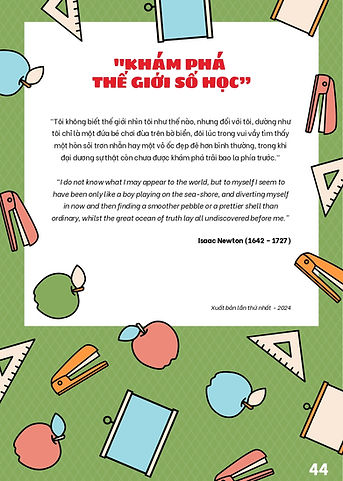
NGUYEN MINH TRI
Mathematics for a Better World
My passion for applied mathematics comes from a belief that numbers can drive real change. To me, math is more than equations — it’s a language for solving global challenges. From modeling renewable energy systems to optimizing resources, I’ve learned how mathematical thinking can turn data into impact.
Mathematics doesn’t just explain the world — it helps us make it better.
Founder
Spreading Knowledge to the Mountains
Founding “Mathematic World” – Empowering Children Through Number
(2023–2024)
I used to believe mathematics was merely about numbers—until I met a little girl in the highlands of Yen Bai who told me, “I want to study math, but my school doesn’t have enough books.”
In that moment, I realized that knowledge should never be a privilege — it should be a bridge to transform lives.
In 2023, I founded Mathematic World, a non-profit club for students passionate about mathematics, with a mission to help underprivileged children in mountainous regions access quality education.
Together with 15 members, I conducted a math proficiency survey of 312 elementary students across three schools in Yen Bai. The results were eye-opening: only 29% of students solved two-step math problems correctly, and just 67% mastered multiplication tables — largely due to language barriers and limited learning resources.
To address this, we created free monthly online math classes for 35 students in Mu Cang Chai. Alongside teaching, our team organized three volunteer trips, donating 100 school supply kits, 50 backpacks, and 50 study lamps — a total contribution worth 30 million VND — to help students study more effectively.
I also served as chief editor of “Exploring the World of Numbers”, a 150-copy math booklet series filled with formulas, quick-solving tips, and illustrated puzzles, distributed for free to three elementary schools in Van Chan District, Yen Bai. After release, 92% of students said they “enjoyed learning math more after reading.”
We later hosted a three-hour webinar titled “Mathematics in Real Life,” attracting 100 students from Yen Bai’s primary and secondary schools. The event featured two guest speakers:
Mr. Le Minh Duc, Mechanical Engineer, Johns Hopkins University
Mr. Nguyen Hoang, Math Teacher, Hung Vuong High School for the Gifted (Phu Tho)
They shared how mathematics connects real-world phenomena with modern science — helping students see that math isn’t confined to textbooks but lives in every aspect of daily life.
Today, Mathematic World has become a small but meaningful learning space — where mathematics is no longer a challenge, but a joy, an opportunity, and a path toward a brighter future.
“Mathematics may begin with a single number — but when shared, it can light up an entire mountain.”














Math Research Assistant, Vietnam Institute of Mathematics
Mathematics in Action – Smart Energy Research
06/2024 – 08/2024
In the summer of 2024, I joined the Vietnam Institute of Mathematics as a Research Assistant in a project focused on renewable energy optimization in smart grids.
There, I explored how mathematical models could turn abstract formulas into real-world solutions. Using graph theory and optimization algorithms, I worked to balance energy distribution between solar and wind sources.
To bring the models closer to reality, I implemented machine learning techniques like Random Forest and XGBoost to predict real-time renewable output and optimize energy storage.
After weeks of analysis, my team and I co-presented a 15-page research paper and a 20-minute presentation that earned 9.5/10 for its innovative application of applied mathematics.
This experience taught me that mathematics is not just a discipline — it’s a language that can decode nature’s patterns and guide us toward a sustainable future.


Electrical Engineering Intern, Hanoi University of Science and Technology
Engineering the Future – Solar Microgrid Internship
05/2025 – 08/2025
A year later, I stepped out of the lab and into the field as an Electrical Engineering Intern at Hanoi University of Science and Technology.
My goal was simple: turn equations into electricity.
I learned to use MATLAB Simulink to design and simulate a mini-microgrid system integrating solar panels, battery storage, and smart load balancing. Then, with my team, I joined the on-site installation of five solar-powered streetlights across campus — monitoring their real-time performance over seven days.
Standing under those lights at night, powered by the very models we designed, I understood how theory and engineering can illuminate both streets and minds.
Mathematics had once again proven itself — not as an abstract pursuit, but as the foundation of real, sustainable change.

